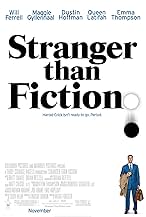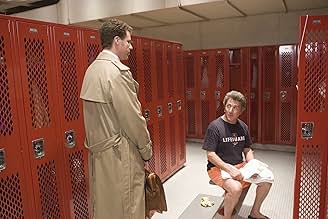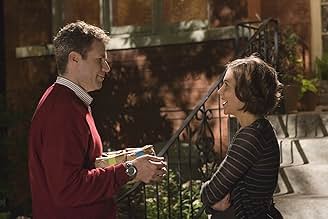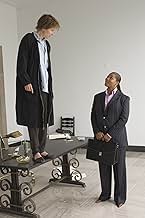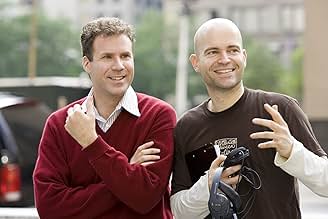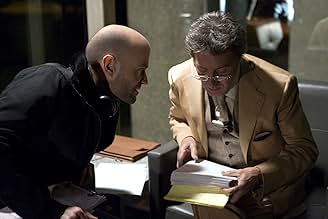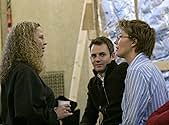Harold Crick se retrouve soudainement au centre d'une narration que lui seul peut entendre: une narration qui commence à affecter toute sa vie, son travail, ses amours, sa mort.Harold Crick se retrouve soudainement au centre d'une narration que lui seul peut entendre: une narration qui commence à affecter toute sa vie, son travail, ses amours, sa mort.Harold Crick se retrouve soudainement au centre d'une narration que lui seul peut entendre: une narration qui commence à affecter toute sa vie, son travail, ses amours, sa mort.
- Récompenses
- 3 victoires et 15 nominations au total
Avis à la une
Directed by Marc Forster and penned by Zach Helm, Stranger than Fiction is an odd mix-mash, combining a standard comedy with existentialist ideas. Number crunching IRS agent and genuine loser, Harold Crick (Ferrell) one day wakes up to find his life being narrated word for word by burnt out writer Karen Eiffel (Emma Thompson). Odd thing is, Eiffel is writing an actual book where Crick just happens to be the main character. To make matters worse, she plans on killing him off as soon as she can make it through a particularly arduous stretch of writer's block.
Originality is one thing that is absent from a majority of contemporary Hollywood pictures, so Fiction immediately gets points for simply trying something different. I suppose it's icing on the cake that the film is genuinely good. Crick, knowing that is death is imminent, begins to break out of his cloistered shell and to experience the fruits of his life. And, in the process he forms a bond with a tax breaking baker (Gyllenhal) and seeks advice from a literature professor, played by a particularly charming Dustin Hoffman
However, even though it is well intentioned, the execution isn't flawless. The romance that develops between Gyllenhal's outcast baker and Ferrell's strait-laced Crick doesn't feel entirely organic. We admire the relationship and smile at its sugar coated sweetness, but we don't necessarily believe their connection. It may taste good, but it doesn't exactly wash down smoothly. Neither, does the film's over reliance on reinforcing generic, "Carpe Diem" philosophies. Towards the second act, things do get sappy. Luckily, by the conclusion, the plot has bounced back to a wonderful limbo of both oddly comic and genuinely heartwarming moments.
For all its flaws, Stranger than Fiction, works. Like a good novel, Forster has fashioned something that is strange, stylistic, and unexpectedly inspiring. And, despite the chinks in its existentialist armor, that's surely something worth writing home about.
Such a theme is usually simplified and subsumed into religious-based tales such as It's a Wonderful Life, but taken as an idea in its own right it has considerable intellectual weight. Harold Crick finds himself the main character in a story as it unfolds, but his annoyance quickly shifts gear as he is aware of the author saying, "Little did he know . . . it would lead to his imminent death."
Not the mindless comedy that the trailer suggests, Stranger Than Fiction is a precise and fairly cerebral story where the laughs stem more from individually appreciating certain aspects of its cleverness rather than any contrived humour.
The surface story is of a man who lives a humdrum if 'successful' life and is awakened to a more three dimensional existence by falling in love. The additional elements will either delight or annoy. IRS auditor Crick (Will Ferrell) starts hearing a voice in his head. It is that of Kay Eiffel (Emma Thompson), a famous author. She describes exactly what he is doing but with a rather better vocabulary than he possesses. When she announces his imminent death, he takes drastic steps to meet her and persuade her to change the ending of her novel.
The characterisation, casting and acting is spot-on. Thompson is at her most refreshingly deranged as the harassed and reclusive author. With a literary equivalence of method acting, Eiffel balances on the edge of her desk trying to imagine the thoughts of someone about to make a suicide jump. She sits in the freezing drizzle watching cars cross a bridge to imagine an accident. Her rants at her 'editorial assistant' (who uses more traditional methods of accessing imagination) give a convincing insight into the creative process. While the voice in Crick's head is stereotypical Thompson, the fuller, isolated character, when we meet her, is a minor revelation. "I don't need a nicotine patch," she declaims angrily to her assistant. "I smoke cigarettes."
Maggie Gyllenhaal, as law drop-out turned baker Ana Pascal, sparkles, glows and is sexily alluring and radiant with passionate love of life - and she manages to light up the screen faster than, say, even Juliette Binoche in Chocolat. Dustin Hoffman has the least challenging of the main parts, but he endows his character (an eminent professor of literature) with the gravitas needed to take ideas of literary interconnectedness seriously. Will Ferrell gives a remarkable break-out performance in a straight role, reminiscent of Jim Carrey in The Truman Show. He is superbly suited to the part as audiences expect him to be a shallow comedy character and here he is trying the find the substantial person inside himself. Most of the audience are concentrating so much on the film's intricate hypothesis and how it is worked out, that only afterwards do we realise what a range of emotions Ferrell has to portray with complete seriousness.
Novelist Kay Eiffel (Thompson) anthropomorphises things like Crick's watch (similarly the official website says, in real time, "As the cursor waited anxiously for the site to load, it couldn't help but feel an overwhelming sense of elation.") We sense a life-imbuing process that might even be likened to what an actor does with his character; but the film goes a stage further by drawing a similarity with the essentially lifeless, clockwork existence of the IRS auditor whose only escape is discovering love with Pascal. His quest is aided by fictional plot analysis from Professor Jules Hilbert (Dustin Hoffman) and of course begs the question, what is fiction?
Director Marc Forster showed consummate skill in portraying the positive escapism of JM Barrie's creative Peter-Pan-writing in Finding Neverland. With Stranger Than Fiction, he has teamed up with brilliant new dramatist Zach Helm. Helm is fascinated with the writing process in what he calls a larger Post-Modern movement. "From Pirandello, to Brecht, to Wilder, to Stoppard, to Woody Allen to Wes Anderson, we can see the progression of a contemporary, self-aware, reality-bending and audience-involving wave in dramatic literature," he says. "I love to see Homer Simpson reacting to his creator, Matt Groenig, or the cast of 'Urinetown' complaining from the stage about their own title."
Even the street names, business names, and the characters' last names of Stranger Than Fiction are significant Crick, Pascal, Eiffel, Escher, Banneker, Kronecker, Cayly, etc. are all puns on mathematicians who focused on the innate order of things. The invitation is to ask what is beyond the symmetry of things.
Stranger Than Fiction meets even its most formidable challenge - making the ending nail-biting and moving after such surreal content. But the ultimate message of the film seems a little trite if it is supposedly coming from a groundbreaking author. Like the glimpses of Eiffel's book, we are given impressive mountains of style but little substance. As the film doesn't press the strengths forcefully by admitting in so many words what it is getting at, there is a chance you may not bother with the subtleties - in which case it adds up to very little.
A superb testament to inventiveness and worthy of awards in many different categories, Stranger Than Fiction somehow falls short of being a masterpiece.
Go see it and take a friend. You will laugh and be happy for a change after leaving a movie.
The film involves Harold Crick (Will Ferrell), an IRS agent who lives his life by a very strict routine. One day, he wakes up, and begins to hear a woman narrating all of his actions. Suspicious, Crick continues attempting to live his life out, but after an inexplicable comment in regards to his "immenent death", he goes on the hunt for the voice. Randomly spliced into Crick's search is Karen Eiffel (Emma Thompson). She is writing a novel about a character named Harold Crick, and is unknowingly the voice Crick keeps hearing. She is battling a case of writer's block, and spends much of the film attempting to come up with the finale for the character.
Unlike many other existential comedies, Fiction is sweet and almost innocent in its design. Yes, the main focus of the film is pretty grim, but the life-altering questions that keep going around during the film do not become anywhere near as depressing and bizarre as those found in the likes of the work of Charlie Kaufman. In a way, Fiction feels a lot like a Kaufman-written film, but lacking in the means of being totally "out there"; almost like being a decaf as opposed to a regular. As a result, while being an excellent film (albeit slightly predictable), it cannot break past the mold already set by the likes of the absolutely brilliant Eternal Sunshine of the Spotless Mind. It just feels like it is missing that spark that could have sprung it right into the brilliance that all films like this strive for.
Going along with the story itself, it feels a little ill-paced in some few instances, but for the most part sucks you right in and keeps you there. It has many comedic elements, and has some great dramatic sequences as well. They all play well, and while I still would not give him a ton of credit, I was very impressed by Helm's first-time effort. His writing feels vibrant and fresh, and in a film industry with absolutely little originality or thought, it is just great that movies like this slip through and get green-lighted. Every piece of dialogue and background feels well expressed, and just play out astonishingly well. On the topic of Crick however, I liked the idea of how neurotic and obsessive Crick was over numbers, but I thought it was a bit of an overkill to include special effect shots showing the numbers being counted within his head. It felt silly in The Da Vinci Code, so why did Sony feel the need to add it here too?
On that note, much like my being impressed by Adam Sandler from time to time, Ferrell really pulls through here, and does give the best performance of his short career. The psychological trauma that his character goes through is evident in his facial and body emotions, and the way he conveys it on screen is nowhere near what I would have expected. He brings an amazing sense of what this character is really about, and gives him a poignancy that makes him so life-like that it becomes almost too great to explain. This is a pathetically sad man who you cannot help but pull for as the film goes on. And for all the right reason too. He may deliver some of the funniest lines in the movie, but he is totally mature and at ease in this role. Thankfully this means that he stays serious for the most part throughout the film, and does not let any Ricky Bobby or Ron Bergundy slip out. He could have easily blown it, but thankfully, manages to stay in check.
Thompson is another particular standout, especially in contrast to Ferrell. She is broken and weak, searching for the perfect ending. The pain and sorrow that goes through her face as she writes and thinks has a poetic excellence to it, and she only continues to prove how good of an actor she is. Dustin Hoffman and Queen Latifah work well in supporting roles, supporting Ferrell and Thompson respectively as the film progresses on. Hoffman has always had great comedic timing, and he does not let it go to waste here. He plays right off of Ferrell in grand ways, and just feels totally at home in the role. Latifah, while not in the film so much, is very good in her bit parts. Maggie Gyllenhaal also shines here, and clearly has the makings for an Oscar sometime in the late future.
For its small problems, Fiction still is able to prove its worth, and is clearly one of the best films of the year. It will be able to stand proud among the other entries in the existential comedy genre, or just stand proud on its own. Helm's screenplay coupled in with an intoxicatingly great performance by Ferrell make for a great trip to the movies. And sure beats some of the crap that's been released over the past few weeks.
9/10.
Forster, with his keen eye and eclectic visual sense, populates the film the sharp and contrasting visual angles, camera tricks, and in-frame oddities (like the play with numbers) constantly keeping the viewer engaged and on their toes. Fun supporting turns from Dustin Hoffman as a literary theorist employed by Krick to help find out if the story he is in is a comedy or tragedy, and Queen Latifah as Eiffel's no-nonsense publishing assistant help guide the viewers through imaginative stretches that are occasionally too clever by half. Ferrel gets to show some nice range here, and much like Robin Williams did with "The World According to Garp" and Jim Carrey did with "The Truman Show," graduates with honors into more high-minded quasi-serious roles. His co-lead Thompson is subtly method and well studied as the reclusive sociopathic author who just can't help killing her characters.
What really seals the deal is Maggie Gyllenhal as Farrell's love interest, the anti-establishment baker he is assigned to audit. She literally lights up the screen. There's one expertly framed and perfectly lit shot of her standing outside her townhouse inviting Farrel in for the night where the light from street lamp off screen is filtered in through the shadows of tree branches and hits her face in such a way that in that brief flickering frame you become insanely happy to be watching such a pleasant marriage of literary concepts inside a visual medium. At this point you don't care how the film ends. You're just grateful to experience that giddy moment of pure movie entertainment.
Le saviez-vous
- AnecdotesWhile filming, Will Ferrell wore an earpiece that fed him Dame Emma Thompson's narrative lines, in order to assist the other cast members in reacting more naturally to Ferrell's seemingly non-sequitur lines.
- GaffesNear the beginning, Ms. Eifel dictates "When asked by a co-worker for the product of 67 and 453, Harold drew a blank. He quickly answered 30,351 despite the answer really being 31,305." The product of 67 and 453 actually is 30,351. This was meant to get viewers to question who was dictating Harold's life, the narrator or Harold himself. It wouldn't be a coincidence that the "incorrect" number given by Harold would in fact be the correct answer.
- Citations
Professor Jules Hilbert: No, why did you change the book?
Kay Eiffel: Lots of reasons. I realized I just couldn't do it.
Professor Jules Hilbert: Because he's real?
Kay Eiffel: Because it's a book about a man who doesn't know he's about to die and then dies. But if the man does know he's going to die and dies anyway, dies willingly, knowing he could stop it, then... I mean, isn't that the type of man you want to keep alive?
- Crédits fousDuring the end credits, the names of the characters and the actors who played them were displayed against stylized images of the places where the characters worked.
- Bandes originalesThe Way We Get By
Written by Britt Daniel
Performed by Spoon
Courtesy of Merge Records
By arrangement with Bank Robber Music
Meilleurs choix
- How long is Stranger Than Fiction?Alimenté par Alexa
Détails
- Date de sortie
- Pays d’origine
- Site officiel
- Langue
- Aussi connu sous le nom de
- Más extraño que la ficción
- Lieux de tournage
- Sociétés de production
- Voir plus de crédits d'entreprise sur IMDbPro
Box-office
- Budget
- 30 000 000 $US (estimé)
- Montant brut aux États-Unis et au Canada
- 40 660 952 $US
- Week-end de sortie aux États-Unis et au Canada
- 13 411 093 $US
- 12 nov. 2006
- Montant brut mondial
- 53 653 224 $US
- Durée1 heure 53 minutes
- Couleur
- Mixage
- Rapport de forme
- 1.85 : 1
Contribuer à cette page







